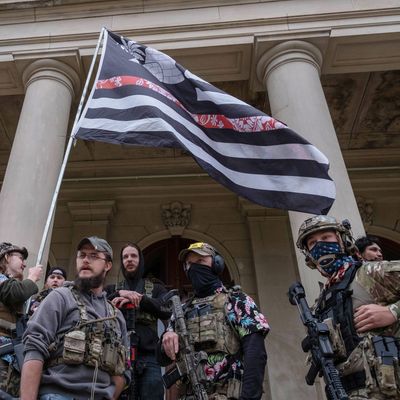
A review of more than 80 far-right groups by the Armed Conflict Location & Event Data Project and MilitaWatch shows an increased risk of violence on and around Election Day. “There is an increasing narrative and trend,” researchers wrote, “that groups are organizing to ‘supplement’ the work of law enforcement or to place themselves in a narrowly defined ‘public protection’ role in parallel with police departments of a given locale.”
Further encouraged by rhetoric from President Trump — like his recent, infamous request for the Proud Boys to “stand back and stand by” — these right-wing militias are said to pose a high-risk threat to election sites in Michigan, Georgia, Pennsylvania, Oregon, and Wisconsin.
The report provides fresh evidence that while there is an extremist threat to public safety, it’s coming from the right and not the left. Trump’s denunciations of antifa, which have been picked up by other Republicans and some Democrats, are a smokescreen. Far-right militias are more active, and more dangerous, and they’re growing at a disturbing clip. In Trump, many see a champion.
They aren’t wrong to think so, either. After authorities arrested members of two Michigan militia groups for plotting to kidnap Governor Gretchen Whitmer, Trump urged supporters chanting “lock her up” to “lock ’em all up” at a rally in the same state. The kidnapping plot reportedly formed after the president tweeted “LIBERATE MICHIGAN!” in April, after Whitmer and other Democratic governors implemented mask mandates and lockdown measures in response to the pandemic. Whitmer accused Trump of inspiring the plot.
In general, Trump’s anti-mask and anti-lockdown posture may have contributed to another trend ACLED identifies in its report. Though far-right militia groups aren’t ideologically monolithic, they do share some common beliefs and tactics, and anti-lockdown protests have become important sites of activity. Black Lives Matter protests have become another catalyst for far-right violence — and law enforcement is often little help.
The ACLED report raises another disturbing point, one that’s key to understanding the extent of the risk these extremist groups represent. Militias are undergoing what ACLED calls “a major realignment,” moving “from anti-federal government writ large to mostly supporting one candidate” — Trump. That shift coincides with another, related trend: Militia activity is increasing as law enforcement consolidates into an armed pro-Trump bloc. “The lack of open sanctions of these groups from public figures and select local law enforcement has given [militias] space to operate, while concurrently allowing political figures to claim little direct responsibility for violent actions from which they hope to benefit,” researchers note.
When violence does happen, figures like Trump either dismiss its gravity — there are “very fine people on both sides,” the president said after a neo-Nazi murdered a woman in Charlottesville — or applaud the culprit. Conservative writers and commentators were quick to express sympathy, or at least a measure of empathy, for Kyle Rittenhouse, the 17-year-old aspiring police officer who is charged with murdering two people during protests in Kenosha, Wisconsin. “People, based on what we know now, I, personally, don’t believe Kyle Rittenhouse is either a villain or a hero,” Rod Dreher wrote at the American Conservative. Others tried to invent justifications for Rittenhouse’s actions: They claimed protesters had threatened him, even throwing a Molotov cocktail in his direction. (There’s no such evidence that last event took place.) A Christian crowdfunding site hosted a fundraiser for his legal fees.
From these facts we can draw an unfortunate conclusion: Militia groups aren’t just becoming more common and more violent, they’re becoming more acceptable. That has long-term implications for the viability of American democracy. The existence of a heavily armed, deeply paranoid faction does not bode well for future elections, even if Joe Biden defeats Trump in two weeks. The horrors Trump has unleashed may be with us for a long time after he’s gone.






























